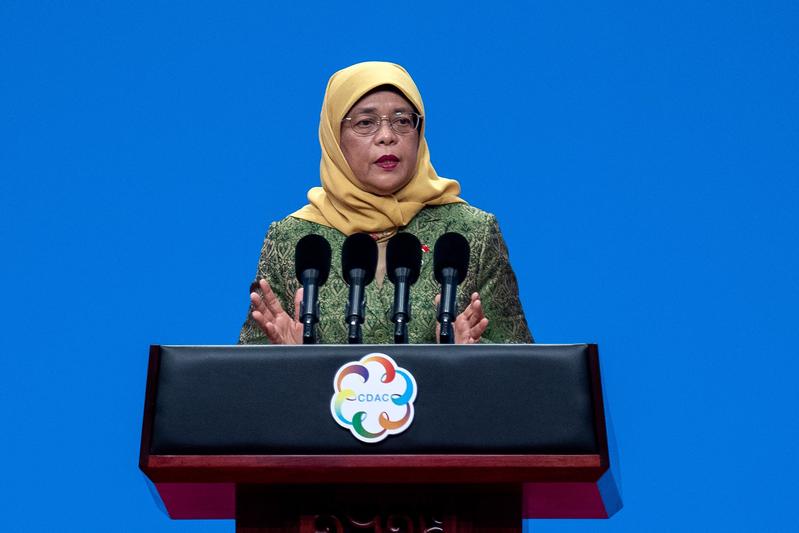 Singapore's President Halimah Yacob delivers a speech during the opening ceremony of the Conference on Dialogue of Asian Civilizations at the National Convention Center in Beijing on May 15, 2019. (NICOLAS ASFOURI /AFP)
Singapore's President Halimah Yacob delivers a speech during the opening ceremony of the Conference on Dialogue of Asian Civilizations at the National Convention Center in Beijing on May 15, 2019. (NICOLAS ASFOURI /AFP)
Singapore must consider tapping past reserves to help its people and businesses “bleeding” from the impact of the coronavirus outbreak, President Halimah Yacob said.
The last time the government tapped into the reserves was in January 2009, when Singapore faced its worst recession amid the global financial crisis
“Many of our companies, particularly those related to the tourism industry, but more broadly other sectors as well, are bleeding because of disrupted supply chains, rapidly falling demand and tightening cash flows,” Halimah said in a Facebook post Wednesday.
Deputy Prime Minister Heng Swee Keat has already signaled the possibility of tapping past reserves for a second stimulus package to combat the economic effects of the virus. The city state last month allocated S$6.4 billion (US$4.6 billion) in support for medical response as well as two special packages to aid businesses and consumers.
READ MORE: Singapore emerges as litmus test for virus containment
“If our public health is at stake and our people’s welfare affected, we need to do the necessary,” Halimah said. She also noted that the crash in oil prices has “seriously aggravated the situation.”
Under the constitution, the president can veto or disagree with the government’s proposals in areas including fiscal matters relating to the reserves. The constitution also protects past reserves, which are accumulated under previous terms of the government.
ALSO READ: Coronavirus: What next for Singapore?
Saving Mindset
Singapore doesn’t disclose the full amount of its reserves. While the central bank and Temasek Holdings Pte, the city state’s investment company, publishes the size of the funds they manage, sovereign wealth firm GIC Pte doesn’t.
The government takes a cautious approach in using the reserves, and has defended against charges that it’s “excessively prudent,” arguing that the city state’s saving mindset keeps it prepared to cushion the economy in times of crisis.
The last time the government tapped into the reserves was in January 2009, when Singapore faced its worst recession amid the global financial crisis. The government used S$4.9 billion of reserves then to help fund property and personal tax rebates, as well as cash handouts to help businesses and workers.
Singapore was among the first economies to respond aggressively to the coronavirus outbreak. The global tally of confirmed virus cases has now surged to almost 125,000, with more than 4,600 deaths and growing hot spots in Europe.


